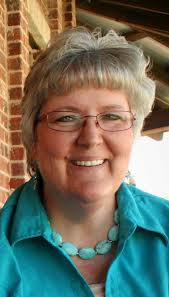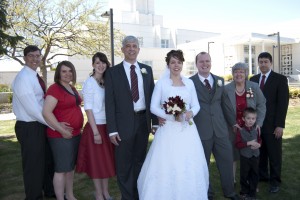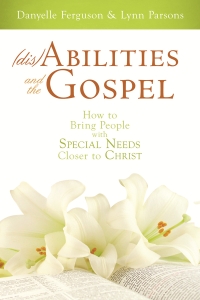(NOTE: If you haven’t yet heard about the contest I’m running through September 24th, go here to see the entry details, as well as the 50+ different prizes, and please think about entering. After all, there’s no limit on number of entries and there are many ways to enter. If you’ve already entered, remember that leaving a comment about this interview earns you yet another entry!)
Currently an Educational Diagnostician, Lynn D. Parsons has worked for years as a Special Education teacher and in May of last year she co-authored one of my blog contest prize offerings, (dis)ABILITIES AND THE GOSPEL, with Danyelle Ferguson. She has a master’s degree in Integrating Technology in the Classroom and is currently working on her PhD. Let’s find out if she has any more books up her sleeve, shall we?
Me: Growing up, did you know anyone personally with special needs and, if so, what was their situation and how did it affect you?
Lynn: My sixth grade teacher had our class buddy up with students in the self-contained class. As we shared activities, we learned they were just like us. It really broke down barriers.
(Smart teacher!)
Me: I see that you graduated from BYU with a bachelor’s degree in Independent Studies. What were your particular areas of emphasis?
Lynn: My capstone project was on non-drug treatments for ADHD. I chose this topic because my friend had a son with ADHD and I saw her struggles. (Me: Wow, you were being prepared even then for your future career.)
Me: Tell us about your family, in particular how you came to understand and cope with the special needs of some of your children. (We’d love to see a family photo, if you don’t mind.)
Lynn: My first experiences as a special needs parent came with one son, who had speech problems and dysgraphia (writing problems). I learned to be an advocate for him to get the services he needed. One daughter also had speech and reading problems, and my previous experiences made it easier to cope. Her first grade teacher thought she would never learn to read. I blamed myself for years for her challenges, until I learned she was born this way. She’s now in her third year at BYU studying to be an occupational therapist.
(Kudos to her and you! Oh, and here’s the promised picture of Lynn’s beautiful family, less one daughter-in-law and a grandchild.)
Me: How about your other children? Were they ever challenged by the special needs in your home?
Lynn: My daughter didn’t speak much until she was over the age of three. She would just make noises and point to what she wanted. Her siblings were as much as ten years older, so they often gave her what she wanted without making her speak. It was easier for them that way.
Me: How did you come to be an Educational Diagnostician and what exactly do you do?
Lynn: My daughter’s speech language pathologist told me how to teach her to read. I bought some books from the teacher supply store and we did it. Her siblings helped by playing phonics games with her while I made dinner. I thought I was Superteacher, so I finished my bachelor’s degree and tried substitute teaching.
I was a substitute librarian for a year, and that was so much fun, I became certified as a special education teacher. I took a grant-funded elementary school position that ended after a year, and then spent seven years teaching special education English in a high school. I wanted to help more students, so I became certified as an educational diagnostician.
I spent one year at two elementary schools, and have been working at a junior high for four years. I test children for learning disabilities, keep the legal paperwork in order, and take charge of the IEP team meetings.
Me: In co-authoring (dis)ABILITIES AND THE GOSPEL with Danyelle, how did you split the writing?
Lynn: We had a spreadsheet with each chapter. I took those that were more “teacher” oriented, and she focused on the parenting and family aspects. We ended up writing half each. We didn’t meet in person, and one difficult challenge was that just before every deadline, someone from our families would end up in the hospital or a computer would crash.
(Well, I, for one, am glad you both persevered!)
Me: You’ve lived in three different states, I believe–Texas, California, and Utah. Which provides the best support systems and services for those with special needs, in your opinion?
Lynn: Texas does. California is so strapped for cash, and hamstrung by ridiculous lawsuits that they can’t do the extensive testing we can. Utah also has far more budgetary restraints and isn’t able to offer the services we do here.
Me: Tell us about “Survivor Bunch” and how you’ve used video to help teach social skills to those with autism and Asperger’s syndrome.
Lynn: I taught this class after school and during the summer. We did all kinds of social skills. Individuals with an autism spectrum disorder tend to be very visual, so it was a natural way to teach. I started it in summer school as a project for my master’s degree. We acted out difficult teen scenarios and job interview skills. My professor thought it was revolutionary and pushed me to get my paper academically published.
I’ve also used it to teach a five-year-old with autism to sign to communicate rather than head-butting adults.
Me: What are you working on now in terms of writing?
Lynn: My biggest project is to finish my dissertation! Hoping to be finished with my PhD by summer of 2014. (Me: We’re rooting for you!)
Danyelle and I are working on a book to help teach religion to those with special needs. I also have an article about reaching out to families with disabilities that will be in the “Liahona” Magazine next year. I’m also planning to work with another author on a book about raising special teens.
Lynn has also posted a number of YouTube videos about working with special needs individuals at church, and she’s created a new website to provide resources. Here’s one of those videos:
You can read more about Lynn and her work on her blog and her website.
Originally posted 2012-09-20 06:00:54.



